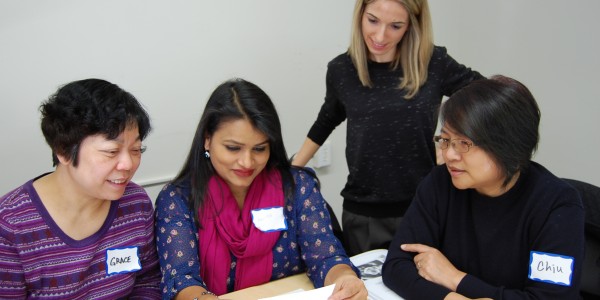Looking for the person inside the patient on 3 Medicine Sub Acute
Sometimes the person gets lost inside a diagnosis of dementia. This is most true for older adults when behaviours that arise with the disease become challenging to the point where they – instead of the patient’s needs and wants — become the focus of care.
To ensure that the person — not the behaviours — remain at the centre of care, nursing and allied health staff from 3 Medicine Sub Acute attended a series of Gentle Persuasive Approaches in Dementia Care (GPA) workshops in December. The training strengthens caregivers’ understanding of dementia and the experience of dementia for the patient and family. The workshops also examined the relationship between the disease and the patient’s behavioural response to it.
“To provide truly patient-centered care, we must continually strive to work in partnership with patients and their families to understand as much as we can about the person and their needs,” said Silvia Nobrega, Clinical Nurse Educator.
Behaviour as meaning
Whether the patient is feeling scared, frustrated or lonely, GPA teaches that the caregiver’s role is to try to understand the need that underlies the behaviour so the patient feels valued and supported.
GPA then focuses on various techniques for responding to behaviors — such as validation therapy and verbal redirection — that have been researched and proven effective when applied in the care setting.
“GPA training strives to shift the caregiver’s focus away from the behaviours and back to the person who requires care,” said Harjender Walia, Program Manager, Medical Services. “It helps caregivers to understand why we see the behaviors that we see and to intervene in a manner that is respectful and acknowledges the person’s fears and concerns.”
GPA on 3 Medicine Sub Acute
Out of the Richmond Hospital Bedmap Redesign, 3 Medicine Sub Acute is now a 28-bed unit where activity and independence is promoted. The physical layout of the unit was improved and specific strategies, such as a central dining area, group exercise classes, and weekly music therapy, have begun on the unit.
Many of the patients on 3 Medicine Sub Acute are elderly with diagnoses of dementia. For staff and caregivers on this new unit, incorporating GPA training seamlessly into daily work flows enables them to provide the best care possible.
“We all felt this course was so helpful. The distraction techniques taught are very good and useful,” said Naaz Karmali, LPN, 3 Medicine Sub Acute. “The course also reminds us that if one person isn’t having success with the patient at that time, wait a bit and then have another nurse try.”
A new culture of dementia care
To provide improved, more competent, and safer care for patients on 3 Medicine Sub Acute, staff need a variety of tools to do their jobs. December’s GPA training helps to address this need.
“In my ten years of nursing, learning about and practicing GPA techniques was a breath of fresh air,” Lindsay McArthur, Patient Care Coordinator. “So often our training and education is based on ideal scenarios and unrealistic situations. GPA truly gave me the tools to use in my every day practice, on a variety of units.”

